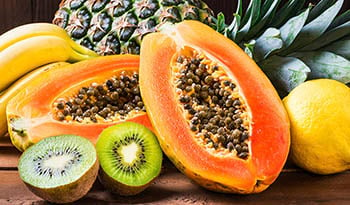Enzymes: Discover Powerful Wide-Ranging Benefits for Health and Wellness

Enzymes are necessary for life. These proteins are responsible for a variety of bodily functions that range from maintaining gut health to removing toxins from the body.
While enzymes are crucial for overall health and wellness, studies suggest that they offer a variety of health benefits that include such diverse functions as supporting nutrient absorption to reducing inflammation.
What Are Enzymes?
Enzymes are special types of proteins that help create essential biochemical reactions in the body. Enzymes are needed for a wide range of biological functions ranging from muscle movements and breathing to producing digestion.
What Do Enzymes Do?
Enzymes act as a catalyst that speeds up the biochemical reactions that occur in the body. Some enzymes break down hydrogen peroxide to become oxygen and water, while some help to make new strands of deoxyribonucleic acid (DNA).
Enzymes also help to break down ingested foods and turn them into usable energy by the body in the process of digestion.
When it comes to the digestion system, each enzyme has a specific action that works in concert with other enzymes to turn food into energy. For example, proteases are enzymes that help break down proteins found in meats and beans, while lipase breaks down fat. Without enzymes, food would pass through the body without being broken down, and there would be no energy extracted. This is essentially what happens in malabsorption disorders like celiac disease and cystic fibrosis.
Celiac disease is an allergy to the wheat protein gluten that damages the lining of the gut. This damage impedes nutrient absorption. Cystic fibrosis is a disease that causes thick mucus secretions that can block organs like the pancreas. This blockage leads to fewer pancreatic enzymes being secreted and a lowered absorption of crucial nutrients like proteins, fats, and fat-soluble vitamins like vitamin A.
Types of Enzymes
Many different types of enzymes come from many different sources.
Amylase
Different parts of the body secrete various enzymes that help break down specific nutrients. For example, the saliva glands in the mouth secrete salivary amylase or ptyalin, which promotes the breakdown of carbohydrates into simpler sugars like glucose.
Trypsin
The enzyme trypsin helps to further break down proteins in the small intestines.
Digestive Enzymes: Lipase, Pepsin, Lactase
Digestive enzymes produced by the digestive tract include lipase produced by the pancreas, pepsin by the stomach, and even lactase, which break down the milk sugar lactose, by the small intestine.
Papain and Bromelain
A variety of enzymes also come from fruits and vegetables, like papain from papayas and bromelain from pineapple.
Some enzymes are even produced from organisms like cows, pigs, and bacteria.
Studies show that enzyme supplementation may benefit not only gut health but overall wellness.
Here are four enzyme benefits.
1. Enzymes May Help Improve Absorption
Research suggests that digestive enzymes may help improve the absorption of nutrients in individuals who have low stomach acid production.
Low stomach acid production, or hypochlorhydria, has been linked to a reduction in the absorption of B vitamins, iron, and calcium. Hypochlorhydria has also been linked to an increase in the development of food allergies.
Research also suggests that low stomach acid may contribute to the overgrowth of bacteria in the small intestine creating small intestinal bacterial overgrowth (SIBO). An increase in stomach acid production may help to improve nutrient absorption while killing harmful bacteria that contribute to SIBO. Betaine hydrochloride, commonly called betaine HCL, is a supplement that may help to increase stomach acid production.
An increase in stomach acid, also known as hydrochloric acid, production may help break down foods more thoroughly, which may increase nutrient absorption throughout the digestive pathway. Betaine HCL, not to be confused with betaine, may act as hydrochloric acid in the stomach once ingested. One study followed six healthy participants to investigate the effects of betaine HCL supplementation on stomach acid production. The study found that betaine HCL increased stomach acid production and re-acidify the stomach’s environment after proton pump inhibitors were taken. Proton-pump inhibitors are a type of medication used for heartburn that may reduce the amount of stomach acid produced.
2. Enzymes May Benefit Functional Gastrointestinal Disorders
Functional gastrointestinal disorders (FGIDs) involve signs and symptoms like abdominal pain, bloating, difficulty swallowing, constipation, and/or diarrhea.
The cause of these signs and symptoms usually cannot be identified through conventional lab tests. FGIDs may have their origin in low-grade inflammation of the intestinal mucus membranes, food intolerances, and even long-term microbial infections. Some studies suggest that 25% of the adult population may suffer from an FGID. Enzymes may help to improve symptoms of FGIDs. For example, research suggests that enzymes may help some individuals who suffer from non-celiac gluten sensitivity.
Non-celiac gluten sensitivity (NCGS) is an FGID condition in which individuals usually cannot obtain a positive diagnosis of celiac disease through testing but experience symptoms when ingesting the wheat protein gluten. Symptoms of non-celiac gluten sensitivity may include headaches, bloating, nausea, vomiting, joint pain, stomach pain, and brain fog. Studies estimate that approximately 1% of the worldwide population may have NCGS.
Taking gluten-digesting enzymes may help prevent symptoms of NCGS. One randomized, single-blind, placebo-controlled study followed 30 participants for 2 weeks to see the effects of a gluten-digesting enzyme on NCGS. The study found that those who took the gluten-digesting enzyme had significantly fewer symptoms of NCGS than the placebo group. Furthermore, no adverse effects were found in the gluten enzyme group.
Research also suggests that supplementing with enzymes may benefit those with irritable bowel syndrome or IBS. Symptoms of IBS include bloating, excessive flatulence, abdominal pain, diarrhea, and/or constipation. One study involving 314 participants diagnosed with diarrhea-dominant IBS (IBS-D) found that supplementing with digestive enzymes helped to improve gut health and reduce IBS-D symptoms within 2 weeks. Another study involving 2125 individuals suffering from functional dyspepsia, a sensation of pain in the middle of the abdomen, found that digestive enzymes reduced pain, bloating, flatulence, and gastrointestinal reflux disease (GERD) symptoms within 2 weeks of supplementation.
3. Enzymes May Benefit a Healthy Heart
Studies have found that high low-density lipoprotein (LDL) or “bad” cholesterol levels have been associated with poor heart health. This is because LDL may leave the liver and deposit in arterial walls causing them to stiffen, which leads to heart disease.
One animal study found that supplementing with digestive enzymes and a probiotic over 4 weeks helped significantly reduce LDL levels. Simultaneously, the study found that the enzyme-probiotic combination may have helped increase high-density lipoprotein (HDL), or “good” cholesterol levels.
Studies show that optimal HDL levels are usually associated with a healthy heart. This is because HDL usually helps remove cholesterol from the bloodstream. After the study, the enzyme and probiotic combination resulted in a 78% reduction in LDL levels and a 52% increase in HDL levels from baseline. The study also found an overall improvement in gut health and an increase in short-chain fatty acid production in the colon.
Short-chain fatty acids may act as fuel for gut cells. Short-chain fatty acids like butyrate may also contribute to the integrity of intestinal membranes. An increase in short-chain fatty acids may indicate that the enzyme and probiotic combination helped create a thriving gut microbiome.
4. Enzymes May Help to Reduce Inflammation
Although enzymes are essential for gut health, they may play other important roles in the body.
Studies suggest that the enzyme serrapeptase, also called serratiopeptidase, may act as a powerful anti-inflammatory and pain reducer. Serrapeptase is an enzyme that comes from the bacteria Serratia marcescens. This bacteria was first isolated from the gut of a silkworm. Serrapeptase is a protease that may help to break down proteins. Research also suggests that serrapeptase may have fibrinolytic activity, which includes the breakdown of blood clots and other damaged, dead, or dying tissues like scar tissue.
One animal study found that serrapeptase supplementation helped reduce inflammation and edema in the extremities just as well as aspirin. Human studies have also found that serrapeptase may help to improve wound healing times and decrease pain. One study found that serrapeptase mixed with clove oil alleviated toothache pain. Another study involving 70 women with painful breasts found that serrapeptase supplementation significantly improved breast swelling and pain. In the study, there were no negative side effects reported. Yet another study involving serrapeptase for carpal tunnel syndrome found that 65% of participants experienced an improvement in symptoms while taking the enzyme. Animal studies have also found that serrapeptase and nattokinase, an enzyme derived from a Japanese food called natto, may have helped break down amyloid fibers in the brain, which contribute to Alzheimer’s disease. The study also found that serrapeptase exhibited a strong anti-oxidant effect as well.
Takeaway
Enzymes are amazing substances. These powerful reaction-causing proteins are responsible for a wide range of bodily functions. Whether the goal is to improve gut health and digestion or reduce inflammation, enzymes may provide a bridge to overall health and wellness.
References:
- Fikree A, Byrne P. Management of functional gastrointestinal disorders. Clin Med (Lond). 2021;21(1):44-52. doi:10.7861/clinmed.2020-0980
- Forssmann K, Meier L, Uehleke B, Breuer C, Stange R. A non-interventional, observational study of a fixed combination of pepsin and amino acid hydrochloride in patients with functional dyspepsia. BMC Gastroenterol. 2017;17(1):123. Published 2017 Nov 25. doi:10.1186/s12876-017-0675-9
- Graham DY, Ketwaroo GA, Money ME, Opekun AR. Enzyme therapy for functional bowel disease-like post-prandial distress. J Dig Dis. 2018;19(11):650-656. doi:10.1111/1751-2980.12655
- Guilliams TG, Drake LE. Meal-Time Supplementation with Betaine HCl for Functional Hypochlorhydria: What is the Evidence? Integr Med (Encinitas). 2020;19(1):32-36.
- Ianiro G, Pecere S, Giorgio V, Gasbarrini A, Cammarota G. Digestive Enzyme Supplementation in Gastrointestinal Diseases. Curr Drug Metab. 2016;17(2):187-193. doi:10.2174/138920021702160114150137
- Ichim TE, Patel AN, Shafer KA. Experimental support for the effects of a probiotic/digestive enzyme supplement on serum cholesterol concentrations and the intestinal microbiome. J Transl Med. 2016;14(1):184. Published 2016 Jun 22. doi:10.1186/s12967-016-0945-2
- Ido H, Matsubara H, Kuroda M, et al. Combination of Gluten-Digesting Enzymes Improved Symptoms of Non-Celiac Gluten Sensitivity: A Randomized Single-blind, Placebo-controlled Crossover Study. Clin Transl Gastroenterol. 2018;9(9):181. Published 2018 Sep 19. doi:10.1038/s41424-018-0052-1
- Jadhav SB, Shah N, Rathi A, Rathi V, Rathi A. Serratiopeptidase: Insights into the therapeutic applications. Biotechnol Rep (Amst). 2020;28:e00544. Published 2020 Oct 17. doi:10.1016/j.btre.2020.e00544
- Panagariya A., Sharma A.K. A preliminary trial of serratiopeptidase in patients with carpal tunnel syndrome. J. Assoc. Physicians India. 1999;47:1170–1172
- Patricia JJ, Dhamoon AS. Physiology, Digestion. [Updated 2022 Sep 12]. In: StatPearls [Internet]. Treasure Island (FL): StatPearls Publishing; 2023 Jan-. Available from: https://www.ncbi.nlm.nih.gov/books/NBK544242/
- Shende P.K., Gaud R.S., Bakal R., Yeole Y. Clove oil emulsified buccal patch of serratiopeptidase for controlled release in toothache. J. Bioequiv. 2016;8:134–139
- Talley, Nicholas J. AC, MD, PhD1. What Causes Functional Gastrointestinal Disorders? A Proposed Disease Model. The American Journal of Gastroenterology 115(1):p 41-48, January 2020. | DOI: 10.14309/ajg.0000000000000485
- Wang H, Li S, Fang S, Yang X, Feng J. Betaine Improves Intestinal Functions by Enhancing Digestive Enzymes, Ameliorating Intestinal Morphology, and Enriching Intestinal Microbiota in High-salt stressed Rats. Nutrients. 2018;10(7):907. Published 2018 Jul 16. doi:10.3390/nu10070907
DISCLAIMER:This Wellness Hub does not intend to provide diagnosis...
















































































 Table of Contents
Table of Contents














